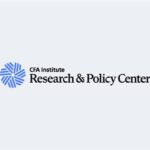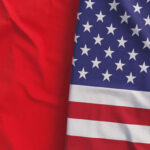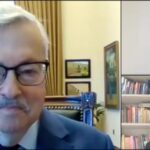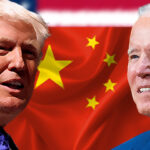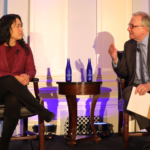The Next Chapter in US-China Relations: A Diplomat’s View
A discussion with former US Ambassador to China, Max Baucus
Earlier this month, U.S. President Joe Biden approved an Executive Order repealing sections of a Trump-era directive banning U.S. investment in certain designated Chinese companies. The Biden order removes ambiguity regarding the treatment of subsidiaries by stating that only specifically listed entities are covered. We believe this clarity is positive for the market and sets the stage for more constructive policymaking. On June 9, 2021, President Biden issued a second Executive Order repealing the Trump ban on Chinese-owned apps TikTok and WeChat, stating the U.S. would undertake a broad national security review of all software applications potentially connected to foreign governments.
With these developments in mind, as well as the recently concluded G7 meetings in London, we would like to share a conversation we hosted between former U.S. Ambassador to China Max Baucus and former U.S. Ambassador to Singapore David Adelman, Managing Director and General Counsel at KraneShares. The discussion centered on the current state of US-China relations and what to expect from the Biden Administration going forward. Above is a video replay of the discussion, and below is a written summary. This is the latest in our series of conversations with leading diplomats on the U.S.-China relationship. We previously hosted a private briefing with Henry Kissinger in New York in 2018.
Summary of The Conversation With Ambassador Max Baucus
Ambassador Baucus described the current U.S. policy towards China as driven by domestic politics rather than rational geopolitical considerations. Baucus believes we can expect the Biden administration to strike a more conciliatory tone when compared to the Trump administration's more confrontational approach. However, he said the Biden Administration will continue to take a firm line with the country that is home to the world's second-largest economy.
Baucus discussed the dramatic changes he has witnessed with regard to the U.S.-China relationship over the past 20 years and especially during his time as U.S. Ambassador to China during the second term of the Obama administration. Baucus and Adelman entered the foreign service at a time when American foreign policy was turning towards the Asia-Pacific region after having been concentrated on the Middle East for the first decade of the Twentieth Century. According to Baucus, Obama's "Pivot to Asia" came with the startling revelation that China could be America's equal. Regarding the current foreign policy situation, Baucus noted that perhaps tension between a rising power and an incumbent power is inevitable.
Baucus characterized the Obama Administration's approach to China as centered on engagement with China and the development of partnerships in the Asia-Pacific region. Baucus supported President Obama's signature multilateral trade agreement, the Trans-Pacific Partnership (TPP), which did not include China but included some of the other large economies in Asia such as Japan, Vietnam, and Singapore. Baucus thinks the Trump Administration's decision to scrap the agreement set the U.S. back in its relations with China's Asian neighbors. Meanwhile, he noted that China has stepped up its engagement with the international community, especially the developing world, through the Belt and Road Initiative (BRI), Asian Infrastructure Investment Bank (AIIB), and the Regional Comprehensive Economic Partnership (RCEP). He noted that U.S. ally Australia participates in both the AIIB and RCEP.
Adelman and Baucus discussed the challenges presented by U.S. policies that force a choice for countries in Asia between the U.S. and China. With the growing economic strength of China, many Asian countries that have always been U.S. allies may nonetheless find themselves in a difficult position, having to choose between trade with China and security engagement with the US.
Adelman asked Baucus whether the Biden Administration will revive some elements of the Obama Administration's policy of engagement with China. Baucus responded that while he could not say for certain, his feeling is that due to the current state of U.S. politics and the critical domestic issues facing President Biden, warming relations with China would not happen quickly but he remained optimistic. He said a comprehensive reassessment of the China relationship is likely on hold for the time being because of the Biden Administration's focus on the pandemic and U.S. infrastructure needs.
Baucus' greatest concerns regarding the U.S.-China relationship are balkanization and a lack of communication between Washington and Beijing. He noted that both the U.S. and China are going to great lengths to secure their supply chains to be less dependent on global trade for specific products. He views such efforts as positive as they reduce the risk of supply shocks that can lead to conflict. However, he urged the U.S. to stop viewing China's efforts at securing its own supply chain with suspicion, saying that China is acting rationally.
Baucus emphasized his concern about a breakdown in lines of communication between the two countries. This concern was the same as that expressed by former U.S. Secretary of State Kissinger in our conversation with him in 2018. Baucus said there was much more interaction between the U.S. and China during his time as ambassador, and he hopes that level of interaction will return.
Nonetheless, Baucus is "cautiously optimistic" that relations between the world's two powers may improve. Regarding existing tariffs, investment restrictions, and the U.S. Holding Foreign Companies Accountable Act (HFCA), Baucus said there are currently too many protective policies in place, which will eventually begin to damage the U.S. economy. Having served in the U.S. Senate with President Biden for decades, he thinks the Biden Administration will recognize that some of these policies are not in America's best interest and there will likely be some easing of restrictions.
Baucus outlined potential areas of cooperation between the U.S. and China in the short and long term. According to both former diplomats, the two powers are most likely to cooperate on combating climate change. Baucus said that China will try to lead the world on climate change, accepting responsibility as the world's largest polluter. However, he noted that China has considerable ground to cover to achieve its goal of carbon neutrality by 2060. Baucus said that coal still accounts for nearly 60% of China's electricity production.
Baucus said that when the U.S. left the Paris Agreement on Climate Change, China took the opportunity to fill the void. Now that President Biden has returned the U.S. to the agreement, the two countries will be inclined to work together.
Baucus is also upbeat about the further integration of the two countries' financial services industries. After being permitted to do so for the first time in 2019, JP Morgan, Goldman Sachs, among other large U.S. banks and brokerage houses, will set up deeper shops in China. Although progress likely will be slow, Baucus said American financial institutions cannot pass up on the China opportunity. Likewise, Baucus is pleased by China's progress in opening its capital markets to foreign investment. He was the U.S. Ambassador in China when the Hong Kong-Shanghai Stock Connect program was established and acknowledged its benefit to China's capital markets.
Baucus remains close with leaders in both Beijing and Washington and thinks they will look for common ground. He acknowledges that the Biden Administration will leave some Trump-era policies in place in the near term but expects there to be loosening of restrictions after a close review of the cost of certain policies to the U.S.

